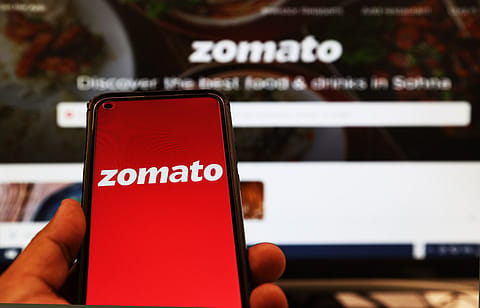Zomato shares zoom 19% to all-time high
Zomato’s quick commerce unit Blinkit plans to increase its stores to 2,000 by the end of 2026.

Shares of Zomato Ltd rose as much as 19% in intraday trade on Friday after the food delivery platform reported a 12,550% jump in net profit for the quarter ended June.
The stock opened at ₹244.50 against its previous closing price of ₹234.09 on the National Stock Exchange (NSE). It rose 19% in intraday trade to hit an all-time high of ₹278.70, taking the new-age company’s market cap to over ₹2.3 lakh crore.
Brokerages remain bullish on the stock. CLSA raised its target price on Zomato to ₹350 from ₹248 earlier. Morgan Stanley also revised its price target to ₹278 from ₹235. Japanese brokerage Nomura has a price target of ₹280 on Zomato, up from ₹225 earlier.
The food delivery platform’s revenue from operations surged 74% year-on-year to ₹4,206 crore in the first quarter.
Zomato’s quick commerce unit Blinkit plans to increase its stores to 2,000 by the end of 2026.
Recommended Stories
“As of now, we see a line of sight of getting to about 2,000 stores for our current business. Most of these stores would be in top 10 cities in India. Beyond the large cities, the size of the market is still undiscovered. How fast we are able to get to this store count, will depend on how well we execute, i.e., how we build our team and how efficiently we scale our supply chain. Speed of execution also comes at the cost of lower short term margins, which we are okay with,” says Albinder Dhindsa, the CEO of the quick commerce arm.
“Our average GOV throughput per store has grown from about ₹6 lakh per day per store when we were at 383 stores exactly a year ago to about ₹10 lakh today when we are at 639 stores. For our top 50 stores today, this number is ₹18 lakh per day per store, and growing,” says Dhindsa.
(INR CR)
“We believe that most of our stores today are under utilised from a capacity standpoint and hence GOV per day per store should continue increasing from here even as we aggressively scale store count,” he says.
Zomato plans to launch a new ‘going-out’ app 'District'. “Zomato and Blinkit are our two large consumer businesses and both of them serve customers' needs at home. However, we also have one of India’s largest ‘going-out’ businesses. Our dining-out business which helps our customers discover restaurants when they want to go out and dine at restaurants. This dining-out business is now operating at a run-rate of $500m+ annualised GOV and is already profitable,” says Deepinder Goyal, founder and CEO, Zomato.
“We believe that there is an opportunity to further expand our going-out offering, building on top of our dining-out business. Additional use cases for customers in the going out space include - movies, sports ticketing, live performances, shopping, staycations etc., some of which we have already launched, or are building as we speak,” Goyal adds.
The share of ESOP charge in the total employee cost has reduced over the years from 54% in FY22 to 31% in FY24 and Zomato expects that trend to continue.
“ESOPs are a critical lever to drive ownership in our organisation - particularly in businesses like ours, which are in early stages of market development across all of our verticals. We want to ensure that our people do the right things for the long-term health of the business and ESOPs help us align their motivation towards this objective,” says Goyal.
(DISCLAIMER: The views and opinions expressed by investment experts on fortuneindia.com are either their own or of their organisations, but not necessarily that of fortuneindia.com and its editorial team. Readers are advised to consult certified experts before taking investment decisions.)